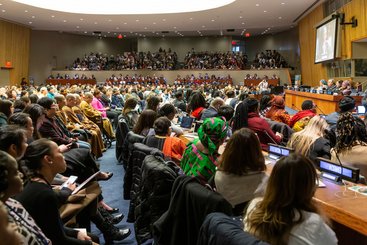The Universal Declaration of Human Rights (UDHR) celebrates its 70th anniversary today.
‘Celebrate’ seems an odd word to use, however, in a year that has seen Syrians gassed and pipe-bombed, Yemenis killed in air strikes, and Rohingya forced from their homes and their villages torched – all seemingly with impunity.
Even in more stable and peaceful societies, including the United States and Hungary, many of the rights associated with healthy civic life – freedom of speech and association, an independent judiciary, the right to privacy – are increasingly threatened or curtailed.
The preamble of the UDHR lamented the ‘barbarous acts’ resulting from the ‘disregard and contempt for human rights’. 70 years on, as the United Nations reaffirms and renews its commitments to peace under its Charter, these words still seem depressingly germane.
Given all that, is the UDHR still relevant 70 years on?
The answer, I would argue, has to be yes.
A cornerstone of international commitments
Respect for the fundamental principles set out in the Declaration’s 30 Articles is a testament of our common humanity. Many of these are now considered customary international law and are regularly invoked by states and in UN declarations and resolutions.
It is also essential to the achievement of the international agreements and frameworks underpinning international efforts on development, humanitarian assistance and peace and security.
Human rights are at the heart of the 2030 Agenda for Sustainable Development. Research from the Danish Institute for Human Rights has shown that more than 90% of the Sustainable Development Goal (SDG) targets are linked to international human rights and labour standards.
Examples include the right to decent work and pay (SDGs 1 and 2; Article 23); the right to a decent standard of living and health and well-being (SDGs 2 and 3; Article 25); the right to a decent education (SDG 4; Article 26); and the right to equality without distinction, including based on gender (SDGs 4 and 10; Articles 1, 2 and 7).
No peace and prosperity without human rights
Clearly, achieving the SDGs will be impossible without a greater commitment to the principles enshrined in the UDHR. And this has to translate into more robust international responses to states or other actors that routinely ignore these principles.
Even more obviously, human rights protection is core to preventing conflict and sustaining peace. Yet time and again, conflicts and crises that are essentially a result of mass human rights abuses either develop into or are framed and responded to as humanitarian crises, rather than crises of human rights.
The Great Lakes crisis in the mid-1990s was essentially a result of the collapse of human rights within Rwanda, but was dealt with as a refugee crisis in neighbouring states.
Likewise, the persecution of Rohingya has become a focus of international concern less for its implications for human rights and impunity inside Myanmar than for its consequences across the border in Cox’s Bazar.
In Venezuela, three million people have left the country to escape political suppression, systematic violations of human rights and economic collapse.
This is no time to abandon the Universal Declaration
Despite routine breaches, it is impossible – even unconscionable – to imagine a world without a strong commitment to basic principles of humanity.
Like similar problems in the application and enforcement of International Humanitarian Law, it is not the Declaration itself that is at fault, or the various legal instruments flowing from it, but the refusal of abusers to abide by its principles, and the failure of the international community to hold them to account.
While the Declaration is not a treaty in the formal sense and did not create legally binding obligations, its repeated violation is nevertheless a moral and political failure that will continue to undermine global commitments to reduce poverty and avert conflict.



